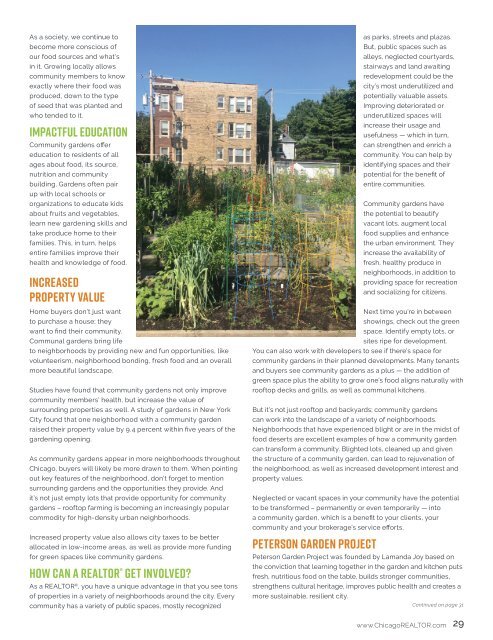CR Magazine – Winter 2017
The official publication of the Chicago Association of REALTORS®.
The official publication of the Chicago Association of REALTORS®.
You also want an ePaper? Increase the reach of your titles
YUMPU automatically turns print PDFs into web optimized ePapers that Google loves.
As a society, we continue to<br />
become more conscious of<br />
our food sources and what’s<br />
in it. Growing locally allows<br />
community members to know<br />
exactly where their food was<br />
produced, down to the type<br />
of seed that was planted and<br />
who tended to it.<br />
Impactful Education<br />
Community gardens offer<br />
education to residents of all<br />
ages about food, its source,<br />
nutrition and community<br />
building. Gardens often pair<br />
up with local schools or<br />
organizations to educate kids<br />
about fruits and vegetables,<br />
learn new gardening skills and<br />
take produce home to their<br />
families. This, in turn, helps<br />
entire families improve their<br />
health and knowledge of food.<br />
Increased<br />
Property Value<br />
Home buyers don’t just want<br />
to purchase a house; they<br />
want to find their community.<br />
Communal gardens bring life<br />
to neighborhoods by providing new and fun opportunities, like<br />
volunteerism, neighborhood bonding, fresh food and an overall<br />
more beautiful landscape.<br />
Studies have found that community gardens not only improve<br />
community members’ health, but increase the value of<br />
surrounding properties as well. A study of gardens in New York<br />
City found that one neighborhood with a community garden<br />
raised their property value by 9.4 percent within five years of the<br />
gardening opening.<br />
As community gardens appear in more neighborhoods throughout<br />
Chicago, buyers will likely be more drawn to them. When pointing<br />
out key features of the neighborhood, don’t forget to mention<br />
surrounding gardens and the opportunities they provide. And<br />
it’s not just empty lots that provide opportunity for community<br />
gardens <strong>–</strong> rooftop farming is becoming an increasingly popular<br />
commodity for high-density urban neighborhoods.<br />
Increased property value also allows city taxes to be better<br />
allocated in low-income areas, as well as provide more funding<br />
for green spaces like community gardens.<br />
How Can a REALTOR ® Get Involved?<br />
As a REALTOR ® , you have a unique advantage in that you see tons<br />
of properties in a variety of neighborhoods around the city. Every<br />
community has a variety of public spaces, mostly recognized<br />
as parks, streets and plazas.<br />
But, public spaces such as<br />
alleys, neglected courtyards,<br />
stairways and land awaiting<br />
redevelopment could be the<br />
city’s most underutilized and<br />
potentially valuable assets.<br />
Improving deteriorated or<br />
underutilized spaces will<br />
increase their usage and<br />
usefulness — which in turn,<br />
can strengthen and enrich a<br />
community. You can help by<br />
identifying spaces and their<br />
potential for the benefit of<br />
entire communities.<br />
Community gardens have<br />
the potential to beautify<br />
vacant lots, augment local<br />
food supplies and enhance<br />
the urban environment. They<br />
increase the availability of<br />
fresh, healthy produce in<br />
neighborhoods, in addition to<br />
providing space for recreation<br />
and socializing for citizens.<br />
Next time you’re in between<br />
showings, check out the green<br />
space. Identify empty lots, or<br />
sites ripe for development.<br />
You can also work with developers to see if there’s space for<br />
community gardens in their planned developments. Many tenants<br />
and buyers see community gardens as a plus — the addition of<br />
green space plus the ability to grow one’s food aligns naturally with<br />
rooftop decks and grills, as well as communal kitchens.<br />
But it’s not just rooftop and backyards; community gardens<br />
can work into the landscape of a variety of neighborhoods.<br />
Neighborhoods that have experienced blight or are in the midst of<br />
food deserts are excellent examples of how a community garden<br />
can transform a community. Blighted lots, cleaned up and given<br />
the structure of a community garden, can lead to rejuvenation of<br />
the neighborhood, as well as increased development interest and<br />
property values.<br />
Neglected or vacant spaces in your community have the potential<br />
to be transformed <strong>–</strong> permanently or even temporarily — into<br />
a community garden, which is a benefit to your clients, your<br />
community and your brokerage’s service efforts.<br />
PETERSON GARDEN PROJECT<br />
Peterson Garden Project was founded by Lamanda Joy based on<br />
the conviction that learning together in the garden and kitchen puts<br />
fresh, nutritious food on the table, builds stronger communities,<br />
strengthens cultural heritage, improves public health and creates a<br />
more sustainable, resilient city.<br />
Continued on page 31<br />
www.ChicagoREALTOR.com 29


















